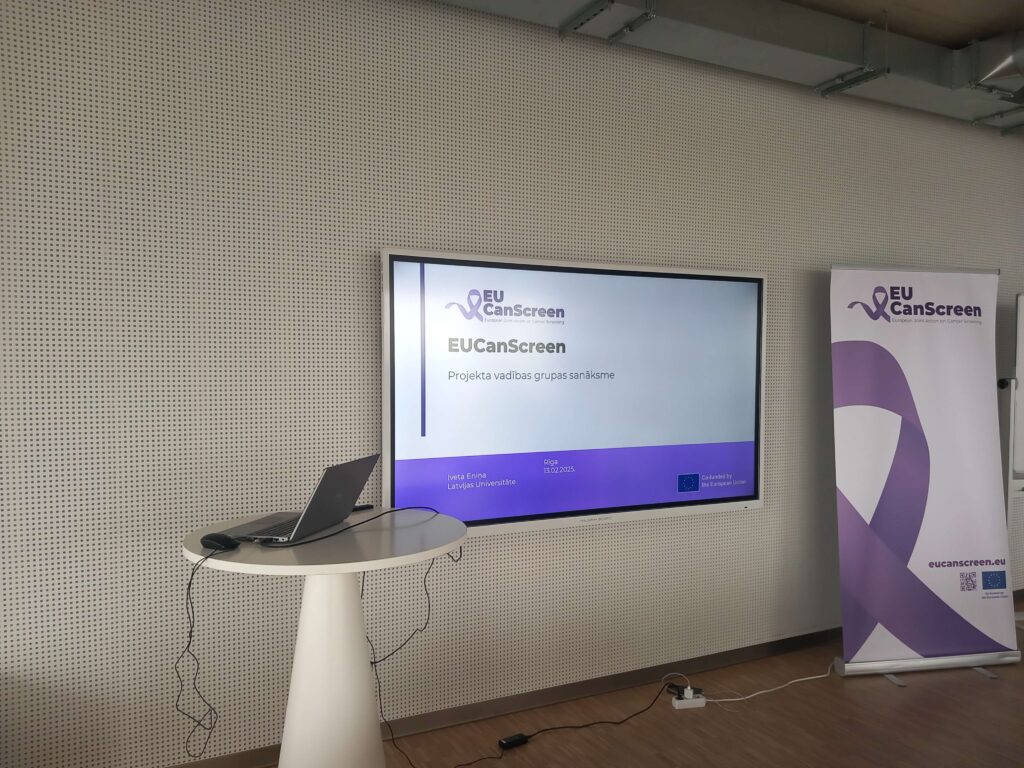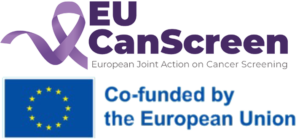Latvia, 13.02.2025
Latvian partners of the EUCanScreen project meet to discuss joint actions for the implementation of cancer screening programmes

On Thursday, 13 February, a significant meeting took place at the House of Science of the University of Latvia, bringing together Latvian partners of the project “Joint Action for Implementation of Cancer Screening Programmes” (EUCanScreen). The meeting was organised by the Institute of Clinical and Preventive Medicine of the University of Latvia (LU KPMI), which is the project coordinator. Representatives from the Centre for Disease Prevention and Control (SPKC), Riga Stradins University (RSU), the Ministry of Health, Pauls Stradins Clinical University Hospital (PSKUS), and the Digestive Diseases Centre “Gastro” participated in the event.
The meeting of partners was an important step in the implementation of the EUCanScreen project in Latvia. The participants reviewed the progress of the project activities so far, shared the experience gained during the project implementation, discussed the challenges, and agreed on the next steps to be taken. Such collaboration is essential to ensure the project’s success, enhance the efficiency and accessibility of cancer screening programs in Latvia, and align them with the needs of the population.
RSU emphasised the importance of education and competence development of health professionals and informed that colposcopy training materials are being developed and a programme for colposcopy training is being developed. The team is also actively working on compiling and evaluating screening information materials. So far, cancer screening information materials in Latvian have been translated, and the common, evidence-based health information evaluation tool MAPPinfo (Mapping the Quality of Health Information) has been used to start an evaluation of these materials.
Representatives from the SPKC also highlighted the need for ongoing training of medical staff and public education on the importance of early diagnosis of cancer to promote the acceptance and participation in screening programmes. It was pointed out that early detection of cancer significantly increases the effectiveness of treatment and patient survival rates. SPKC drew attention to the importance of ensuring that quality and effectiveness indicators for cancer screening programs are calculated according to a common methodology, and work on the implementation of the relevant tasks has already been started within the project. Additionally, the project includes planned collaboration between SPKC and the Digestive Diseases Centre “Gastro” in order to provide specialists training for performing colonoscopies.
The EUCanScreen project will continue work on evaluating and improving existing screening programmes as well as the introduction of new screening programmes. Collaboration with healthcare professionals and public awareness campaigns about the importance of cancer screening will also continue. All participants acknowledged that this joint exchange of experience and collection of insights is highly valuable and will help to ensure the best quality results possible, which is essential for the development of cancer screening programmes, and for ensuring their sustainability and accessibility not only for the residents of Latvia but across Europe as well.


Subscribe to our newsletter to get news and updates.
Subscribe to our newsletter to get news and updates.

The general objective of EUCanScreen is to assure sustainable implementation of high-quality screening for breast, cervical and colorectal cancers, as well as implementation of the recently recommended screening programs – for lung, prostate and gastric cancers. EUCanScreen will facilitate the reduction of cancer burden and achieving equity across the EU.
This project has received funding from the European Union’s EU4HEALTH Programme under the Grant Agreement no 101162959











